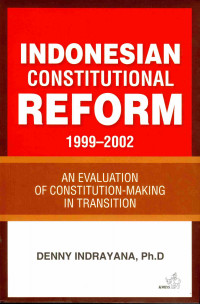
Text
Indonesian Constitutional Reform 1999-2002 An Evaluation of Constitution - Making in Transition
In 1999, the MPR1 (Majelis Permusyawaratan Rakyat, the People’s Consultative Assembly) enacted the First Amendment to the 1945 Constitution of Indonesia. Over each of the next three years, it passed a further amendment. Despite their important contribution to Indonesia’s transition from Soeharto’s authoritarian regime, no comprehensive study has been made of these four amendments, and the process by which they were produced. This thesis is an attempt to fill this gap, by critically evaluating the process and outcomes of these amendments, in the context of constitutional theory and the experience of other countries, in particular, South Africa and Thailand.2 This thesis argues that the 1999-2002 constitutional amendments lacked what have widely been accepted as key features of a democratic constitution-making process: (i) there was no clear plan for determining the key elements of the process, such as when the amendment would occur, how it would be conducted, and what the amendment would be; (ii) the MPR failed to win the people’s trust in its capacity as a constitution-making body; and (iii) public participation was limited and badly organized.
Availability
| KP.III.000129 | KP.III IND i | My Library | Available |
Detail Information
- Series Title
-
-
- Call Number
-
KP.III IND i
- Publisher
- Jakarta : PT. Kompas Media Nusantara., 2008
- Collation
-
xxiv, 464p. ; 21 cm
- Language
-
English
- ISBN/ISSN
-
978-979-709-394-5
- Classification
-
KP.III
- Content Type
-
-
- Media Type
-
-
- Carrier Type
-
-
- Edition
-
Dec 2008
- Subject(s)
- Specific Detail Info
-
-
- Statement of Responsibility
-
-
Other version/related
No other version available
File Attachment
Comments
You must be logged in to post a comment
 Computer Science, Information & General Works
Computer Science, Information & General Works  Philosophy & Psychology
Philosophy & Psychology  Religion
Religion  Social Sciences
Social Sciences  Language
Language  Pure Science
Pure Science  Applied Sciences
Applied Sciences  Art & Recreation
Art & Recreation  Literature
Literature  History & Geography
History & Geography